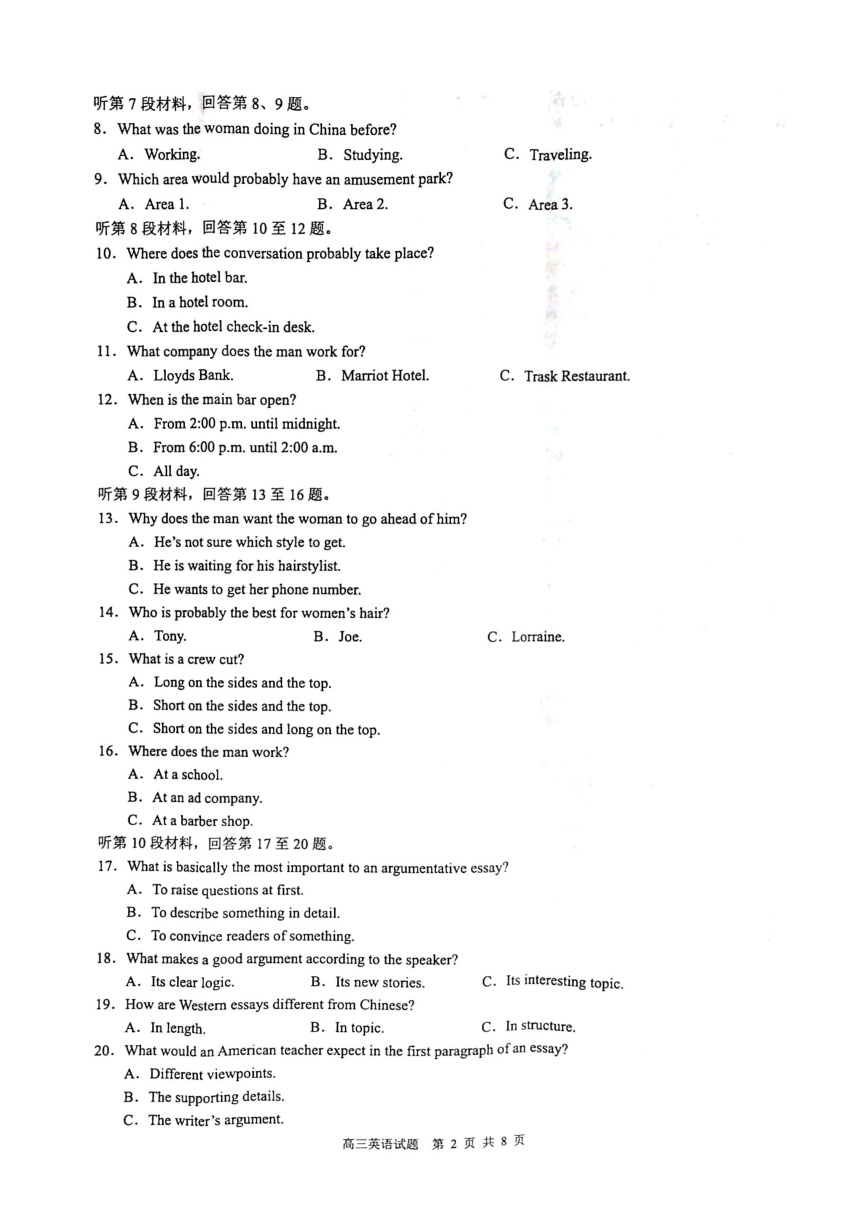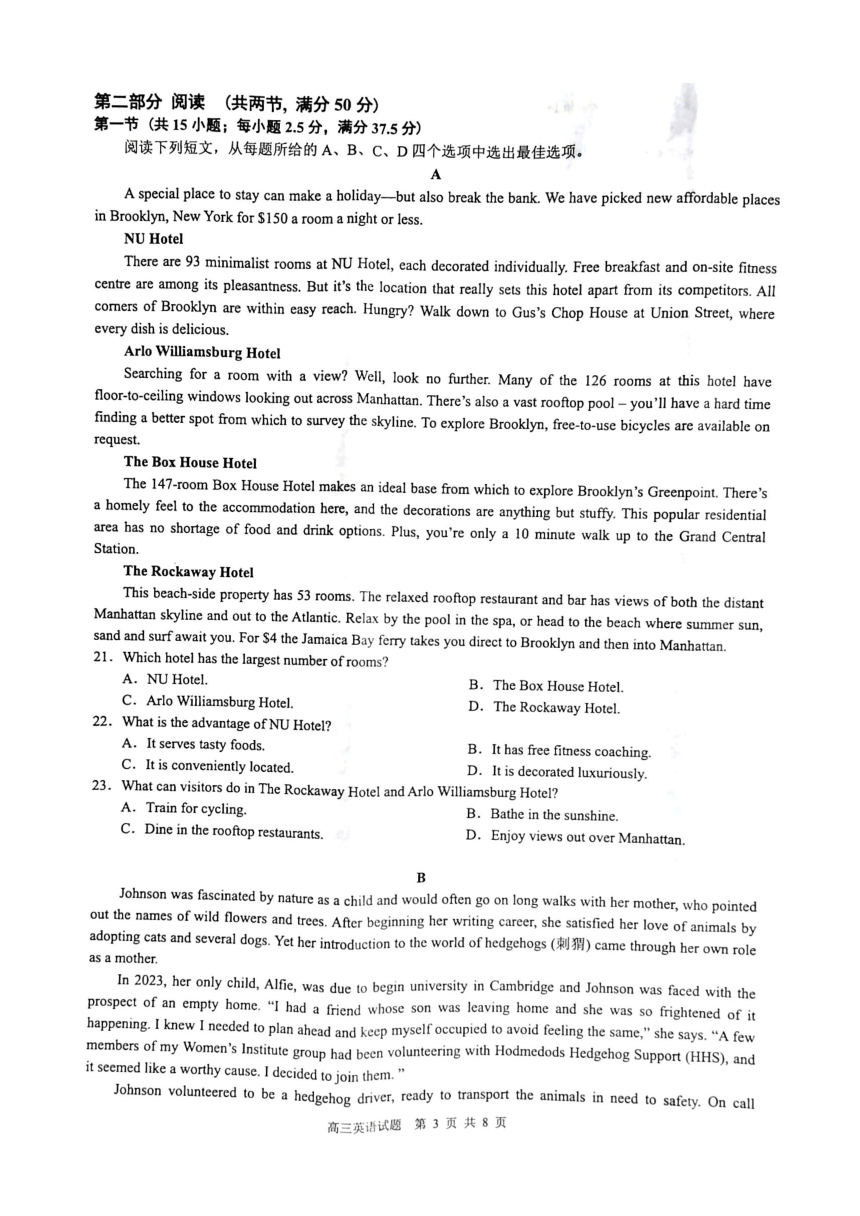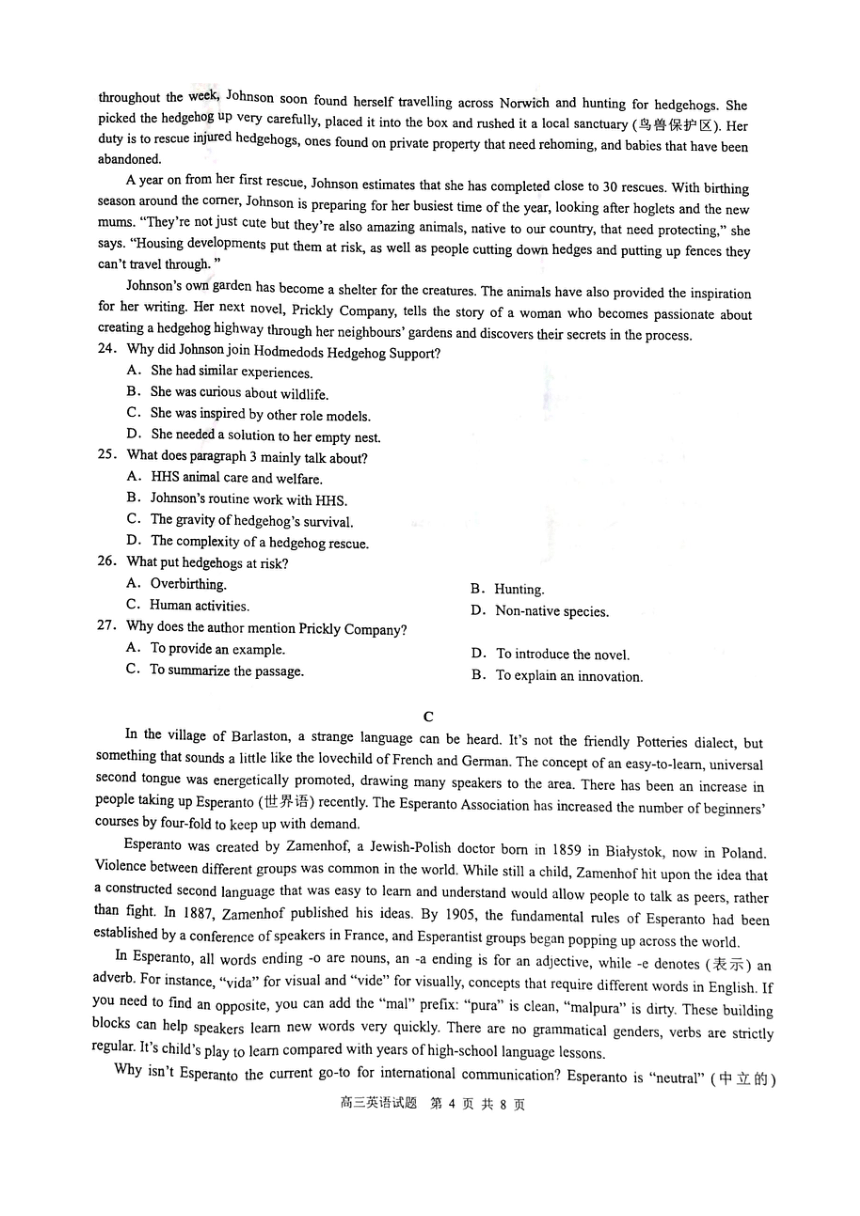江浙皖高中发展共同体2024-2025学年高三上学期10月联考英语试题(PDF版,无答案)
文档属性
| 名称 | 江浙皖高中发展共同体2024-2025学年高三上学期10月联考英语试题(PDF版,无答案) |

|
|
| 格式 | docx | ||
| 文件大小 | 4.6MB | ||
| 资源类型 | 教案 | ||
| 版本资源 | 通用版 | ||
| 科目 | 英语 | ||
| 更新时间 | 2024-10-06 00:00:00 | ||
图片预览




文档简介
because it is not a national language,but that also means it does not have a state backing its use abroad."eople
having to make a choice will see English as the financially better option,"says Sammy Kennedy,a young
Esperantist who helps promote Esperanto in Manchester.oer,Esperanto gives you things that English will
never be able to give you.He credits the"accepting and caring"Esperanto-speaking community with helping
him to overcome loneliness.
28.What phenomenon is described at the beginning of the text
A.Esperanto is gaining popularity.
B.Local dialects are hard to follow.
C.Beginners'courses are profitable.
D.Small villages attract more tourists.
29.Why was Esperanto initially created
A.To replace English.
B.To advance medicine.
C.To ease peer pressure.
D.To promote world peace.
30.What does paragraph 3 mainly tell us about Esperanto
A.Its development
B.Its distinct features.
C.Its appeal to the kids
D.Its links with English.
31.What does Kennedy say Esperanto brings to its speakers
A.A sense of belonging.
B.Better financial options.
C.Higher academic grades.
D.A strong national identity.
D
We are all guilty of grabbing our phones and scrolling through social media when times get boring.
Psychologists have noted in numerous studies over the past decade that individuals engage in social media and
other digital media to escape boredom.However,the same studies reveal that consuming such media can actually
increase boredom in individuals.
That result may be a product of constantly "switching"between different content online,the endless pursuit of
the next piece of media to alleviate present boredom.
To investigate the role that fast-forwarding and switching videos has in boredom,Dr Katy Tam,the lead
author of the research and researchers performed two experiments on about 1,200 people.In the first trial,the
study participants had two viewing experiences.They both watched a 10-minute video without the option to
switch or fast-forward and then had a 10-minute period where they could switch between seven 5-minute videos.
In the second experiment,participants watched a 10-minute video in one round and in the other round were
allowed to fast-forward or rewind through a 50-minute video.
Participants predicted they would be less bored with the option to switch or fast-forward for both experiments
but reported afterward that they found watching one video all the way through to be more engaging,satisfying and
meaningful.
Tam said boredom was closely linked to attention."We feel bored when there's a gap between how engaged
we are and how engaged we want to be,"she said."When people keep switching through videos,they become
lesengaged with the vidos and they are looking for somthing morinteresting This can ad toesed
feelings of boredom.”
Finlly,said Tam,it could be worth taking your time before hitting the fast-forward or skip buttons."
高三英语试题第5页共8页
having to make a choice will see English as the financially better option,"says Sammy Kennedy,a young
Esperantist who helps promote Esperanto in Manchester.oer,Esperanto gives you things that English will
never be able to give you.He credits the"accepting and caring"Esperanto-speaking community with helping
him to overcome loneliness.
28.What phenomenon is described at the beginning of the text
A.Esperanto is gaining popularity.
B.Local dialects are hard to follow.
C.Beginners'courses are profitable.
D.Small villages attract more tourists.
29.Why was Esperanto initially created
A.To replace English.
B.To advance medicine.
C.To ease peer pressure.
D.To promote world peace.
30.What does paragraph 3 mainly tell us about Esperanto
A.Its development
B.Its distinct features.
C.Its appeal to the kids
D.Its links with English.
31.What does Kennedy say Esperanto brings to its speakers
A.A sense of belonging.
B.Better financial options.
C.Higher academic grades.
D.A strong national identity.
D
We are all guilty of grabbing our phones and scrolling through social media when times get boring.
Psychologists have noted in numerous studies over the past decade that individuals engage in social media and
other digital media to escape boredom.However,the same studies reveal that consuming such media can actually
increase boredom in individuals.
That result may be a product of constantly "switching"between different content online,the endless pursuit of
the next piece of media to alleviate present boredom.
To investigate the role that fast-forwarding and switching videos has in boredom,Dr Katy Tam,the lead
author of the research and researchers performed two experiments on about 1,200 people.In the first trial,the
study participants had two viewing experiences.They both watched a 10-minute video without the option to
switch or fast-forward and then had a 10-minute period where they could switch between seven 5-minute videos.
In the second experiment,participants watched a 10-minute video in one round and in the other round were
allowed to fast-forward or rewind through a 50-minute video.
Participants predicted they would be less bored with the option to switch or fast-forward for both experiments
but reported afterward that they found watching one video all the way through to be more engaging,satisfying and
meaningful.
Tam said boredom was closely linked to attention."We feel bored when there's a gap between how engaged
we are and how engaged we want to be,"she said."When people keep switching through videos,they become
lesengaged with the vidos and they are looking for somthing morinteresting This can ad toesed
feelings of boredom.”
Finlly,said Tam,it could be worth taking your time before hitting the fast-forward or skip buttons."
高三英语试题第5页共8页
同课章节目录
